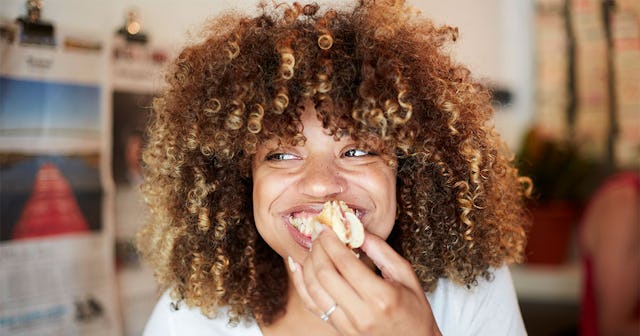Why We Should Stop Using Phrases Like 'Being Good' And 'Cheat Day'

I’ve always been a small woman, both in stature and weight. I am five feet tall on a good day. With heels, I hit 5 f00t 1 or maybe 5 foot 2. My weight has fluctuated over the years. At my smallest, I was 87 pounds; at my largest, 133. And even when they were full with milk, my breasts never exceeded a C cup. I am short. Petite. A tiny girl, through and through. But I have seen the effects of diet culture firsthand. I have been teased for being too small. Some have called me sickly. Others have joked about anorexia.
I’ve been told I need to eat. Suggestions range from ingesting a cheeseburger to (and I quote) eating a “fucking sandwich.” And some jest that they cannot see me. I’m so tiny I blend in with my surroundings. But the most detrimental comments I’ve received are also the most well-meaning. I’ve been praised for “being good.”
“I wish I could eat like you.”
Of course, this may seem like an odd thing to complain about. After all, friends — and, on occasion, strangers — have lauded my willpower. I am “disciplined” and have “self-control.” But using phrases — and praises — like these are dangerous (and problematic) because starving yourself isn’t admirable. Withholding nutrients isn’t something which should be applauded, and avoiding food is ridiculous. It is a sign something is wrong. How do I know? Because I had a full-blown eating disorder. I drank black coffee and ate baby food, but only during set intervals. Eating could only be done at specific times. And I wasn’t “good” or well-behaved — I was hurting.
I was struggling. I was sick.
For years.
There are other problematic phrases, too. The notion of “cheating” or “cheat days” is faulty. It suggests that eating, in and of itself, is something which we should feel shame for. Cheating is rule-breaking and bad. We cheat on tests, on our partners, and on our taxes. By combining the two words, we imply eating is negative. Referring to certain foods as “sinful” or “naughty” and others as “guilt-free” is morally and ethically concerning. Food is food is food. We need it to survive and thrive. And telling people things like “you lost weight; you look great” or “you’re not fat, you’re beautiful” isn’t just in poor taste, it’s wrong. People can be beautiful and healthy at any size. They can also be skinny and sick.
“In our culture, commentary on food and bodies is everywhere,” an article on SELF explains. “This doesn’t affect just those of us diagnosed with mental-health conditions like eating disorders. It can hurt anyone who has ever had a negative relationship with food or their body, and that’s almost all of us.” Yes, most of us have an unhealthy relationship with ourselves and/or food.
The good news is there are things we can do, individually and as a whole, to change the conversation. To alter the way we eat and perceive ourselves. Firstly, we can and should understand what food is — and what it isn’t. The diet (and, in many ways, wellness) industry has weaponized food. It has made us see meals as calories in and calories out. And while this is, in fact, how weight loss works, food is — first and foremost — a substance which helps our body grow. It protects our heart and feeds our brain. It gives us energy and, in turn, life, and eating is essential to human development, and the development of any living creature.
It is important we remember this.
Second, we can change how we talk about our bodies. Instead of saying you’re cheating, say you’re eating. You’re living life. Instead of referring to foods as “good” or “bad,” simply refer to them as what they are: popcorn, apples, chicken, and chips. And instead of commenting on your appearance or that of another, comment on their personality. “You’re so smart. You’re so happy. Wow; today, you really seem so full of life.” You can also say things like “I’m proud of myself for being still today. For listening to my needs.”
Finally, if you want to have a healthier relationship with your body, you need to own it, love it, and say a big fuck you to the diet industry with its flowery language and those before and after ads. Because pills don’t make you “good.” Pre-portioned meals don’t make you “healthy,” no matter the gimmick or the brand. And happiness isn’t in a number or weight. Every size is beautiful. Fed is best.
This article was originally published on